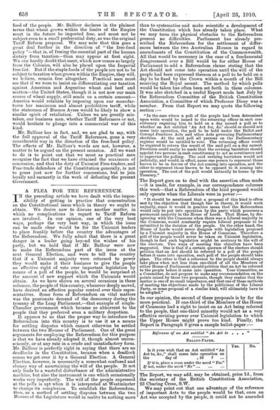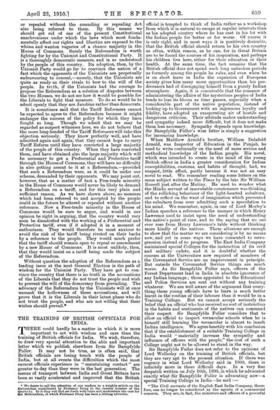A PLEA FOR THE REFERENDUM.
IN the preceding article we have dealt with the impos- sibility of getting in practice that concentration on the Constitutional issue which in theory we ought to obtain. We desire now to discuss another matter, in which no complications in regard to Tariff Reform are involved. In our opinion, one of the very best ways, perhaps the very best way, in which the issue can be made clear would be for the Unionist leaders to place frankly before the country the advantages of the Referendum. We fully admit that there is a great danger in a leader going beyond the wishes of his party, but we hold that if Mr. Balfour were now to make the Referendum part of the issue at the next General Election, and were to tell the country that if a Unionist majority were returned to power they would make it their business to give the people an effective right of veto over important legislation by means of a poll of the people, he would be surprised at the amount of new support which the Unionists would obtain. As we have shown on several occasions in these columns, the people of this country, whenever deeply moved, have desired an effective popular control over their repre- sentatives. Some form of Referendum on vital matters was the passionate demand of the democracy during the tyranny of the Long Parliament,—that example of 'single- Chamber government which became so abhorrent to the people that they preferred even a military despotism. It appears to us that the proper way to introduce the Referendum into this country is to use it as a means for settling disputes which cannot otherwise be settled between the two Houses of Parliament. ' One of the great arguments for employing the Referendum for this purpose is that we have already adopted it, though almost uncon- sciously, or at any rate in a crude and unsatisfactory form. Mr. Balfour is perfectly right in saying that there are no deadlocks in the Constitution, because when a, deadlock comes we get over it by a General Election. A General Election, however, is necessarily a somewhat confused-and clumsy way of ascertaining the will of the people. It not only leads to a wasteful disturbance of the administrative machine, but also the instrument is one which occasionally works very imperfectly. The will of the people expressed at the polls is apt when it is interpreted at Westminster to change its complexion. To -establish the Referendum, then, as a. method of settling disputes 'between the two Houses of the Legislature would in reality be nothing more than to systematise and make scientific a development of the Constitution which has already taken place. What we may term the physical obstacles to the Referendum present no difficulties. Parliament has already pre- scribed the Referendum for the settlement of differ- ences between the two Australian Houses in regard to amendments of the Constitution of the Commonwealth. All that would be necessary in the case of a fundamental disagreement over a Bill would be for either House of Parliament to add a Referendum clause stating that the Act should not come into operation until the will of the people had been expressed thereon at a poll to be held on a day to be fixed by the Crown within a month of the Bill receiving the Royal assent. The method by which polls would be taken has often been set forth in these columns. It was also sketched in a useful Report made last July by the Referendum Committee of the British Constitution Association, a Committee of which Professor Dicey was a member. From that Report we may quote the following section :- "In the case where a poll of the people had been determined upon writs would be issued to the returning officer in each con- stituency requiring him to hold on a day named a poll as to whether an Act entitled An Act for, &c.' should or should not come into operation, the poll to be held under the Ballot and Corrupt Practices Acts and other Acts governing Parliamentary elections. At the said poll all persons on the Parliamentary reaister would be entitled to vote. The returning officer would be required to return the result of the said poll on a day named. Provision could easily be made that the revising barristers should appoint two persons in each constituency to act as scrutineers and to supervise the polling. The said revising barristers would act judicially, and would, in effect, name one person to represent those known to be in favour of the Act coming into operation, and the other to represent those known to be opposed to it coming into operation. The cost of the poll would naturally be borne by the Treasury?'
The Report goes on to deal with the assertion often made —it is made, for example, in our correspondence columns this week—that a Referendum of the kind proposed would. only operate when the Liberals were in power :— " It should be mentioned that a proposal of this kind is often met by the objection that though fair in theory, it would work unjustly, since it would in practice mean that the Referendum would only be put into operation by the party which possesses a, permanent majority in the House of Lords. That House, by dis- agreeing with the Commons when there was a Liberal majority in the Commons, would constantly require Liberal proposals to be submitted to the decision of the people. On the other hand, the House of Lords would never disagree with legislation proposed by a Unionist majority in the House of Commons. Therefore a poll of the people would never be taken on Unionist legislation, though in fact such legislation might be contrary to the will of the electors. Two ways of meeting this objection have been suggested. One is that if a certain quorum of the electors should petition that an Act should be referred to a poll of the people before it came into operation, such poll of the people should take place. The other is that a reference to the people should always take place when not less than one-third of all the Members of either House of.Parliament should petition that an Act be referred to the people before it came into operation. Your Committee, as a Committee, do not propose to make any recommendation on the points raised by these two proposals, though they realise that the matter is one of no small importance, and that one of these methods of meeting the objections made by the politicians of the Liberal Party, or some proposal of a similar kind, will ultimately have to be adopted?'
In our opinion, the second of these proposals is by far the more practical. If one-third of the Members of the House of Commons had a right to insist on an. Act being referred to the people, that one-third minority would act as a very effective revising power over Unionist legislation to which the Upper House might prove too kind. Finally, the Report in Paragraph 9 gives a sample ballot-paper :— Reference of an Act entitled "An Act to . . • "
BALLOT-PAPER.
Is it your wish that an Act entitled "An Act to, &c.," shall come into operation on
the day of , 19 P ...
If it is, place a cross under the word " Yes."
If not, under the word "No" ... ... ...
YES.
No.
The Report, we may add, may be obtained, price ld., from the secretary of the British Constitution Association, 23 Charing Cross, S.W. We may point out that one advantage of the reference of important Acts to the people would be that, once an Act was accepted by the people, it could not be amended or repealed without the amending or repealing Act also being referred to them. By this means we should get rid of one of the present Constitutional anachronisms under which the laws which most funda- mentally affect our rights and liberties are exposed to the whims and wanton vagaries of a chance majority in the House of Commons. Surely the Referendum is worth fighting for by the Unionist and Constitutional Party. It is a thoroughly democratic measure, and is so understood by the people of this country. Its adoption, then, by the Unionist Party would go far to convince the nation of a fact which the opponents of the Unionists are perpetually endeavouring to conceal,—namely, that the Unionists are quite as ready as their rivals to bow to the will of the people. In truth, if the Unionists had the courage to propose the Referendum as a solution of disputes between the two Houses, we do not see how it would be possible for the Liberals to fight that measure. To do so would be to admit openly that they are Jacobins rather than democrats.
It is sometimes said that the Tariff Reformers cannot be expected to agree to the. Referendum because it might endanger the success of the policy for which they have fought so long. Though we admit that we may be regarded as suspect witnesses here, we do not believe that the more long-beaded of the Tariff Reformers will take this objection seriously. They know perfectly well, and have admitted again and again, that they cannot hope to carry Tariff Reform until they have converted a large majority of the people of this country. When they have converted them, and have obtained also the large majority which will be necessary to get a Preferential and Protective tariff through the House of Commons, they will have no difficulty in also getting assent to it at a Referendum,—provided that such a Referendum were, as it could. be under our scheme, demanded by their opponents. We may point out, however, that as a matter of fact a Free-trade minority in the House of Commons would never be likely to demand a Referendum on a tariff, and for this very plain and sufficient reason. As we have shown above, no measure which had been referred to and accepted by the people Could in the future be altered or repealed without another reference. Now a Free-trade minority in the House of Commons would be sure to argue, and would in our opinion be right in arguing, that the country would very soon be dissatisfied with the working of a Preferential and Protective tariff, even if it adopted it in a moment of enthusiasm. They would therefore be most anxious to avoid the risk of the tariff being riveted on their backs by a reference to the people. They would much prefer that the tariff should remain open to repeal or amendment by a new House of Commons. It is most unlikely, then, that they would insist on a tariff being made the subject of the Referendum.
Without question the adoption of the Referendum as a leading issue at the next General Election is the path of wisdom for the Unionist Party. They have got to con- vince the country that there is no truth in the accusations of the Liberals that they do not trust the people and wish to prevent the will of the democracy from prevailing. The advocacy of the Referendum by the Unionists will at once unmask the hollowness of these accusations, and will prove that it is the Liberals in their latest phase who do not trust the people, and who are not willing that their wishes should prevail.*















































 Previous page
Previous page